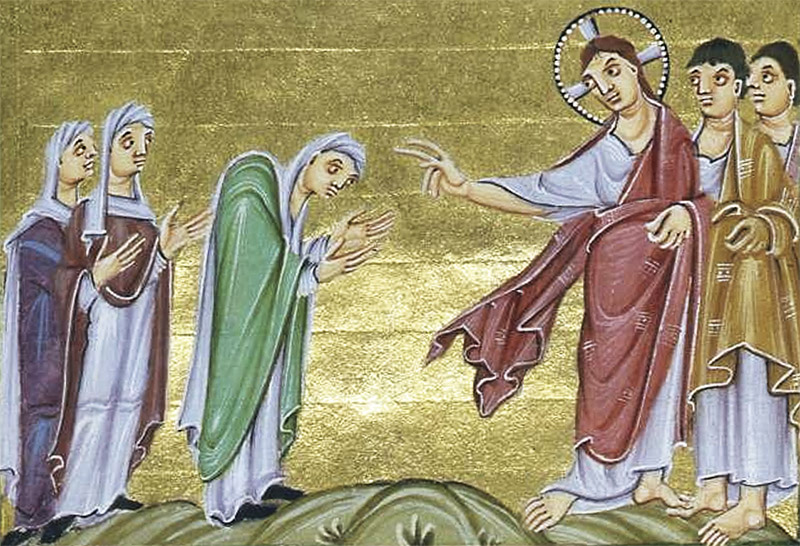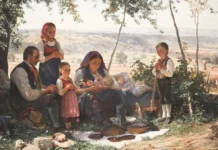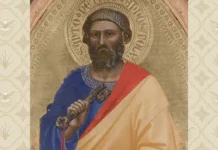When the soul aspires to heavenly goods, it remains upright, without the least bending. And evil spirits, seeing it persevere in its virtue, cannot “pass over” it, that is, sow unclean desires.
In the Gospel passage just proclaimed (Lk 13:6-13), you have heard, brethren, the account of two episodes – that of the barren fig tree and that of the woman who was bent over – that call our attention to God’s merciful goodness. The first expresses it by a comparison, the second makes it tangible by means of an action. […]
People with bent spirits
“And there was a woman who had had a spirit of infirmity for eighteen years; she was bent over and could not fully straighten herself” (cf. Lk 13:11). […]
All sinners are concerned about the things of the earth and do not seek those of Heaven. They are incapable of looking upwards. Following the desires that pull them down, their spirits become bent over and they see only that upon which they think without ceasing.
Look to your hearts, dear brethren, and examine continually the thoughts that have revolved in your mind: one thinks of honours, the other of money and another of increasing his patrimony. All these are base things, and when a man gives himself to them, he loses his uprightness. And if he does not raise himself up to desire heavenly goods, he will end up like the bowed woman, absolutely incapable of looking upwards.
Reason shows us the right way, but we lack strength
The Gospel text goes on to say: “And when Jesus saw her, He called her and said to her, ‘Woman, you are freed from your infirmity.’ And He laid His hands upon her, and immediately she was made straight” (Lk 13:12-13).
He called and straightened that woman; He enlightened and helped her. At other times, however, He calls but does not heal. His grace enlightens us without being able to help us because of our faults. In fact, it is not uncommon for us to perceive clearly what we should do without being able to accomplish it. We try at first, but then we falter. Reason shows us the right way, but we lack strength to follow with works.
This is part of the punishment that comes from sin. The gift of grace makes us capable of seeing good, but our actions turn us away from what we had seen. The repetition of a fault ensnares the soul such that it can no longer resume its upright position. It will try, but it will fall again; and, even though not wishing to, will commit again the fault in which it has voluntarily persisted for a long time.
“I am utterly bowed down and prostrate”
The psalmist described this curvature of ours very well, when he said, symbolizing the whole human race: “I am utterly bowed down and prostrate” (Ps 38:6).
He considered that man, though created to contemplate the light from above, was expelled from Paradise because of his sins. Darkness then began to reign in his soul, making him lose his desire for heavenly things and turn all his attention to the earthly. And suffering to see mankind, to which he belongs, reduced to such a state, the psalmist exclaims, speaking of himself: “I am utterly bowed down and prostrate.”
If, having lost sight of heavenly goods, men would think only of the needs of the flesh, they would undoubtedly be bowed down and humiliated, but not to the utmost extreme. Now, since necessity causes their thoughts to slip from the consideration of heavenly things, and moreover, they are drawn to forbidden pleasure, they are not merely bowed down, but bowed down to an extreme.
Those who pursue only earthly things are not members of Christ
On this subject, another prophet says of the unclean spirits: “who have said to you, ‘Bow down, that we may pass over’” (cf. Is 51:23).
When the soul aspires to heavenly goods, it remains upright, without the least bending. And the evil spirits, seeing it persevere in its virtue, cannot “pass over” it, that is, sow unclean desires.
They say: “Bow down, that we may pass over” because, if the soul does not bow down to desire earthly things, their wickedness has no power against it. They cannot pass over it. By its inflexibility in applying itself to higher things, such a soul strikes fear in them.
It is we, dear brethren, who make way for the evil spirits when we covet the things of the earth and bow down to seek transitory goods. Therefore, let us be ashamed to covet the things of the earth in such a way. Let us blush with shame for offering the back of our spirit to those adversaries who wish to walk over it.
Moses prohibited hunchbacks from being promoted to the priesthood
He who is bowed down always looks to the earth, and he who seeks earthly things forgets the price at which he was redeemed. Thus is understood the precept of Moses, absolutely forbidding hunchbacks to be promoted to the priesthood (cf. Lev 21:20). Now all of us who have been redeemed by the Blood of Christ have become members of this High Priest.
Hence Peter declares to us: “you are a chosen race, a royal priesthood” (1 Pet 2:9). But he who is a hunchback looks only at the things here below and is excluded from the priesthood, for he who cares only for the things of the earth shows that he is not a member of the High Priest.
Further in this regard, the faithful people were forbidden to eat fish that had no fins, because fish with fins and scales usually jump out of the water. And what does this symbolize but the souls of the elect?
Surely only the souls sustained on earth by the fins of their virtues pass into the body of the Church of Heaven. Due to their desire to attain eternal beatitude, they know the art of leaping out of the water, eagerly soaring to the contemplation of celestial things, although they must soon descend due to the weight of their mortal nature.
Let us consider our curvature with horror
Thus, dear brethren, since we now recognize the goods of the heavenly Homeland, let us consider our curvature with horror. Let us keep in mind the bowed woman and the fruitless fig tree. Let us remember the evil we have practised and apply fertilizer to the root of our heart, so that by its fertilizing action, even that which repulsed us in earthly life, through penance may one day yield for us the fruit of the reward.
And if we are unable to practise the virtues in all perfection, God himself will rejoice to see us deplore our incapacity. We will give Him pleasure by the simple fact of beginning to do penance for the sins committed. And our weeping will be of short duration, for the eternal joys will have promptly wiped away our passing tears, through Our Lord Jesus Christ who, being God, lives and reigns with the Father, in the unity of the Holy Spirit, for ever and ever. ◊
Excerpts from: ST. GREGORY THE GREAT.
Homilies on the Gospels. Homily XXI,
pronounced in the Basilica of St. Lawrence the Martyr, 9/6/591:
PL 76, 1228-1232







